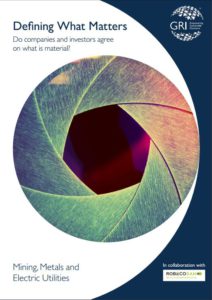
International sustainability standard setter GRI and RobecoSAM, the investment specialist focused exclusively on Sustainability Investing (SI), have today released the research publication Defining What Matters: Do companies and investors agree on what is material? The publication, funded by the Alcoa Foundation, examines whether the information companies disclose in their sustainability reports correlates with what investors want to know. The study found general alignment between disclosed topics and investor interests. The research also indicates GRI’s approach to materiality is appropriate as a basis for disclosures to investors, as it gives a broad perspective on risk. Additionally, these new findings indicate a number of ways in which companies can improve their disclosures to make them even more relevant for investors.
Materiality is the threshold at which topics become important enough to be disclosed. To investigate whether companies are reporting information that meets investors’ needs, GRI and RobecoSAM studied 129 sustainability reports from three sectors, mining, metals and electric utilities and uncovered a number of findings:
1) In all three sectors, there is general alignment between the topics disclosed and information investors want to know, though this is less the case for companies in the electric utilities sector.
2) GRI Standards are well placed to form the basis of disclosures for investors as evidenced by the fact that RobecoSAM’s investor-driven approach to materiality complements GRI’s approach.
3) Investors want companies to disclose more in depth information that explains the relevance of disclosed topics to corporate strategy and the assessment of opportunities and risks. This provides investors with the insights they need to understand the long-term potential of companies.
4) There is agreement among investors and corporations on the growing importance of a materiality analysis for defining the most important sustainability issues.
Alyson Slater, Knowledge Director, GRI: “Conducting a thorough materiality assessment, based on multi-stakeholder standards, is the best way a business can ensure it discloses the information its investors and other stakeholders need for informed decision making. This is about much more than producing a sustainability report. Determining the business’ most important sustainability topics informs overall strategy, risk and opportunity management and even product design. This study also highlights how important it is for companies to do their own materiality assessment to identify issues, which may not yet be financially material but could be in years to come.”
Christopher Greenwald, Head of SI Research, RobecoSAM: “This research and our experience from the annual assessment for the Dow Jones Sustainability Indices again underscores the growing importance of materiality for both companies and investors. Some companies are unclear about the expectations of investors when conducting a materiality analysis and this research helps to clarify their needs. While investors require consistent data on the most material issues, they are also increasingly requiring a greater understanding of how companies connect their sustainability priorities to their long-term corporate strategy.”
Download Defining What Matters: Do companies and investors agree on what is material?
You can learn more about this topic during the session Are investors getting the information they want from the extractives and energy sectors? at the 5th GRI Global Conference, 18 – 20 May, in Amsterdam.



